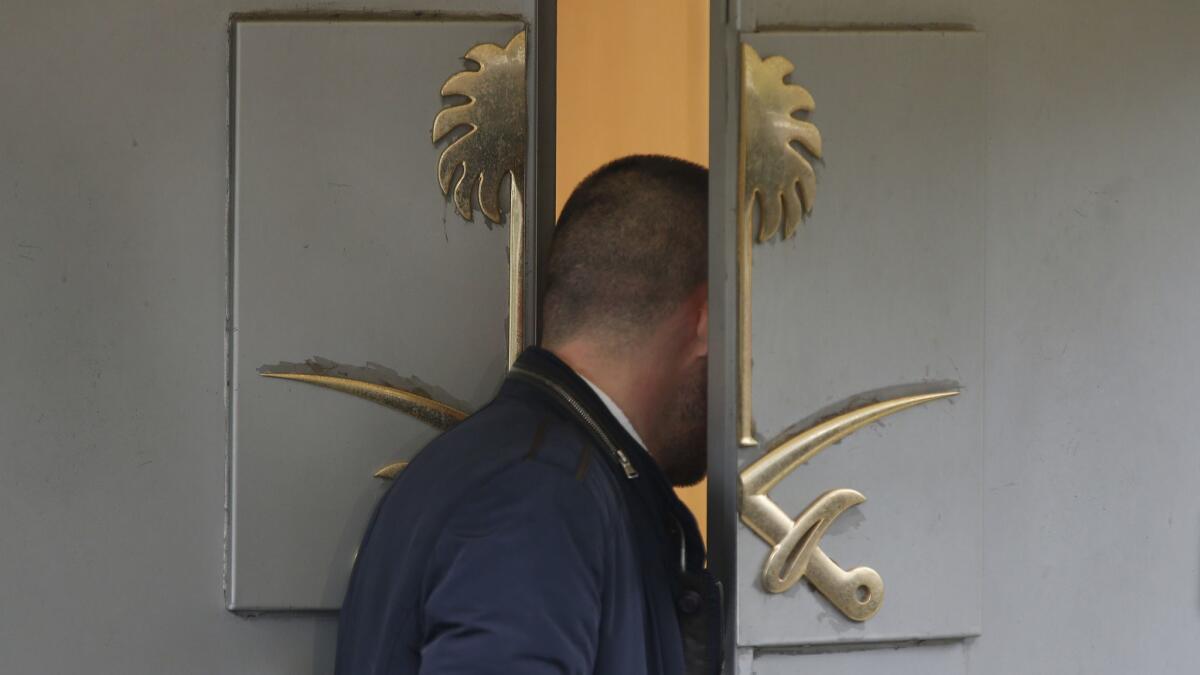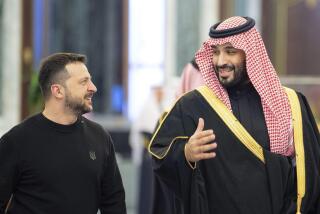Saudi account of Khashoggi’s death runs into a wall of skepticism in Washington

Reporting from Washington — The Saudi government moved Sunday to shield Crown Prince Mohammed bin Salman, the ascendant power inside a royal family with longstanding ties to U.S. leaders, from the fallout over the death of journalist Jamal Khashoggi, but its efforts encountered bipartisan skepticism in Washington.
Khashoggi’s killing inside the Saudi consulate in Istanbul, Turkey, earlier this month was part of a “rogue operation,” Saudi Foreign Minister Adel Jubeir said in an interview with Fox News. He denied that Prince Mohammed ordered a murder or that the people responsible were associated with him.
“This was an operation where individuals ended up exceeding the authorities and responsibilities they had,” Jubeir said, speaking from Riyadh, the Saudi capital. So far, Saudi officials have said they arrested 18 people and dismissed five senior officials, including a top intelligence official, in connection with Khashoggi’s death.
In Washington, however, the Saudi account drew sharply worded criticism, including from Republican allies of President Trump.
“What happened here was savagery, and we can’t go along with their cover story,” Rep. Peter T. King (R-N.Y.) told ABC’s “This Week.”
Sen. Bob Corker (R-Tenn.), who chairs the Senate Foreign Relations Committee, told CNN’s “State of the Union” that he believes the crown prince was responsible for Khashoggi’s death.
“If he’s gone forth and murdered this journalist, he’s now crossed the line, and there has to be a punishment and a price paid for that,” Corker said.
Follow the latest news of the Trump administration on Essential Washington »
Khashoggi, a Saudi national who had been critical of the royal family and lived in self-imposed exile in Virginia, was killed Oct. 2 inside the consulate.
After more than two weeks of denying any role in Khashoggi’s death — indeed, insisting that he left the consulate shortly after he arrived — Saudi officials Friday claimed that he died during a scuffle with a team of security agents who had tried to persuade him to return to Saudi Arabia, an explanation which met with widespread disbelief and mockery.
The 59-year-old journalist went to the consulate to obtain documents needed for his upcoming wedding. According to accounts in the Turkish press, which have cited unnamed Turkish investigators, he was beaten and killed and his body was cut up by a Saudi forensic expert with a bone saw.
The Turks have kept up steady pressure on the Saudis by leaking information about Khashoggi’s killing in the country’s tightly controlled press. Many of the accounts have focused on the claim by Turkish officials to have audio recordings of Khashoggi’s murder. The Turks have not made any recording public, however.
On Sunday, Turkish President Recep Tayyip Erdogan indicated no let-up in the pressure campaign, saying he would make a statement on the slaying during a meeting of his ruling political party set for Tuesday.
“We seek justice, and this will be revealed in all its naked truth, not through some ordinary steps but in all its naked truth,” Erdogan said at a ceremony in Istanbul, according to a report from Daily Sabah, a Turkish newspaper. He added that the “incident will be revealed entirely.”
“Why did these 15 people come here [to Istanbul], why were 18 people arrested [in Saudi Arabia]? These need to be explained in detail,” Erdogan said.
The scandal has shown no signs of dissipating, and the royal family appears to have been caught by surprise by the international reaction after being allowed to operate with relative impunity for years.
Saudi Arabia has pursued a disastrous war with Yemen that has created what the United Nations calls the world’s worst humanitarian crisis and routinely has cracked down on dissidents within its own borders — all without arousing the kind of outrage that Khashoggi’s death has generated.
Now, the death of Khashoggi, who contributed a column to the Washington Post and was well known within U.S. media and foreign policy circles, has plunged the kingdom into perhaps its worst foreign policy crisis since the revelation in 2001 that Saudi subjects plotted and carried out the Sept. 11 terrorist attacks.
Sen. Richard J. Durbin (D-Ill.), the second-ranking Democrat in the Senate, told NBC’s “Meet the Press” that “the crown prince has his fingerprints all over this” and called for the expulsion of the Saudi ambassador to the United States.
Even Trump, who has gone out of his way to provide the Saudi royal family with the benefit of the doubt, took a harder line on the case Saturday night in an interview with the Washington Post.
“Obviously there’s been deception, and there’s been lies,” Trump said, referring to earlier Saudi accounts. The previous day the president had downplayed concerns that Riyadh had misled him about Khashoggi’s disappearance.
It’s unclear whether the crisis will lessen or end Trump’s support for the 33-year-old Saudi crown prince, who has forged a close relationship with Jared Kushner, the president’s 37-year-old advisor and son-in-law.
In his interview with the Washington Post, Trump said he has not made up his mind about Prince Mohammed.
“Nobody has told me he’s responsible,” Trump told the Post. “Nobody has told me he’s not responsible.”
“I would love if he wasn’t responsible,” he added.
Jubeir, in his interview with Fox News, Trump’s favored cable news channel, said the team of people responsible for Khashoggi’s death had tried to cover up their mistake.
“We are determined to find out all the facts, and we are determined to punish those who are responsible for this murder,” Jubeir said.
Prince Mohammed, often known by his initials, MBS, became the crown prince in June 2017, making him next in line to the throne occupied by his father, King Salman. Young and ambitious, he launched an effort to soften Saudi Arabia’s image by allowing women to drive, and has sought to remake the economy by reducing the country’s reliance on the oil industry and attracting international investment.
Critics have described his reform efforts as superficial, barely masking the regime’s ruthlessness in cracking down on internal dissent. Khashoggi’s death has been a reminder of that record.
“Both the crime and incompetent coverup should make everyone question the judgment of Saudi leadership— and worry given the country’s importance to the region and world,” tweeted Richard Haass, president of the Council on Foreign Relations.
Staff writer Nabih Bulos in Istanbul contributed to this report.
Twitter: @chrismegerian
More to Read
Get the L.A. Times Politics newsletter
Deeply reported insights into legislation, politics and policy from Sacramento, Washington and beyond. In your inbox three times per week.
You may occasionally receive promotional content from the Los Angeles Times.











